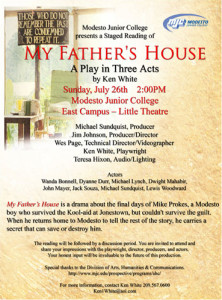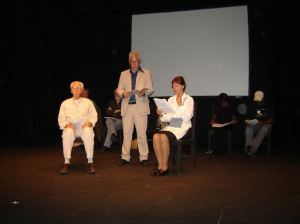 They say the streets of hell are paved with good intentions. Ask Mike Prokes. He grew up white, affluent, and stoned on “-ologies” and “-isms” of California in the Sixties. He wanted to make a difference. He went to Guyana with Jim Jones as one of his bright-faced, eager, young lieutenants. He survived the Kool-Aid, but he couldn’t survive the guilt. Following a confess-all press conference, he shot himself in the bathroom of a Modesto motel.
They say the streets of hell are paved with good intentions. Ask Mike Prokes. He grew up white, affluent, and stoned on “-ologies” and “-isms” of California in the Sixties. He wanted to make a difference. He went to Guyana with Jim Jones as one of his bright-faced, eager, young lieutenants. He survived the Kool-Aid, but he couldn’t survive the guilt. Following a confess-all press conference, he shot himself in the bathroom of a Modesto motel.
Mike was me and I was him. We grew up in the same, small Central Valley town. We went to the same schools. We played sports. We hung out at drive-in movies, listened to rock ‘n roll music, and participated in the mobile mating ritual known as cruising. We did all the things a boy did growing up in the Fifties and Sixties in the Valley.
As young men and children of the Sixties, our priorities shifted. We wanted to change the world and make it new again. So we got involved. We campaigned for Clean Gene and Bobby. We marched. We resisted. We saw our heroes shot down. We got gassed. We got angry. We got disillusioned. But we never gave up. We kept looking for the right answer. And the right path. And the right leader.
Unfortunately, Mike followed the wrong Messiah. And he paid for it. With his most precious possession.
That’s why I wrote the play, My Father’s House. I wanted to know more about why he did what he did. And what happened along the way.
In order to understand that, I went back in time. I researched. I read books, magazine articles, and blogs. I talked with friends and family. I spoke with reporters who were there the night he shot himself. I watched news broadcasts, documentaries, and films on Peoples Temple and Jonestown. I immersed myself in the noble experiment.
I started out thinking I was going to write something about good intentions gone bad and America’s heart of darkness. I didn’t realize how truly ugly and bizarre and sick so much of it was. I could never have imagined the depths of depravity Jones and some of his followers would sink to. I had a hard time believing that all these intelligent, well-intentioned people could do what they did. I discovered that at the right time and place, anyone is pretty much capable of anything.
It was sometimes too much to live in that world, even for a moment.
Some of the friends and colleagues who have read the play and/or experienced it live, say it is a cross between a stage play and a screenplay. I suspect that’s because I use a number of documentary film clips and sound effects. I also rely heavily on good old rock ‘n roll – music and lyrics. The film clips and music act as the Greek chorus. The imagery and music send the audience to a different place than the stage experience does.
Last summer, we held a staged reading that was an invaluable learning experience. It allowed me to hear the words and see the actions, as well as the actors’ interpretations of the characters and the director’s vision of the story. It inspired me to use even more media elements than originally planned. The director and I are now contemplating the idea of recording some of the actors and then having the live performers interact with the recorded performers. This approach would add yet another dimension and would also allow us to take the production on the road at a more reasonable cost.
Our next step in the journey is to refine the script and prepare it for production.
Movie legend Samuel Goldwyn once quipped, “If you want to send a message, use Western Union.” Unlike Mr. Goldwyn, I believe all memorable media has an underlying message or theme that audiences want to experience. In this play, that message is that we need to keep our eyes open so it doesn’t happen again. We need to be vigilant. I felt this story needed to be resurrected and re-told because there is an entire generation that wasn’t born when it took place. They need to know what happened, so they won’t get fooled again.
This play is ultimately about seeking and bestowing forgiveness. Forgiving can’t change the past but, without it, the future doesn’t stand a chance. If we cannot forgive, we must relive. The ability to forgive is what separates us from the rest of the animals. Forgiveness is hard, but it’s one of the easiest things we can ever do.
I plan to provide updates on the progress of the play as it moves through its next stages. Please stay tuned.
The ends were noble. The means were not. The means won.
(An article about the play and the staged reading written by Lisa Millegan Renner of The Modesto Bee appeared in her paper and on the Religion News Service. Ken White can be reached at ken1white@aol.com.)
